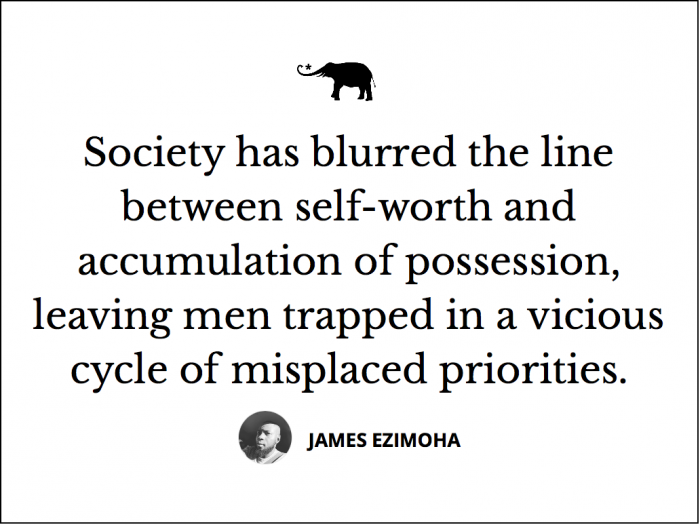View this post on Instagram
What is self-worth, and how does it relate to gender-based violence?
In economics, producers determine the value of a commodity, and a visible price tag highlights its worth. Customers then consider and validate its worthiness before making a purchase.
The validation of a commodity’s worth and the determination of its value are exogenous, leaving it vulnerable to manipulation by external influences.
Thanks to consciousness, humans can determine their own value and present their worth by what they think of themselves, how they feel about themselves, and the actions they exhibit.
Think of it as God’s gift to humans—the freedom to declare worth on an invisible, infinitely adjustable scale.
According to Merriam-Webster, self-worth is a sense of one’s own value as a human being.
It is the power and capacity to write our own script, tell our own story, stand tall on the back of inner beauty or crumble under the weight of despair…all by our own hands.
Self-worth is the soul-stick by which we measure our enoughness or neediness.
Self-worth and men
In the 1960s, Aaron T. Beck developed the Cognitive Behavioral Therapy (CBT) model, which incorporates the Cognitive triangle concept—a triangular loop connecting our thoughts, emotions, and behavior.
It shows how experiences propel thoughts, how thoughts trigger feelings, and how feelings inspire actions. For men and gender-based violence (GBV), lack of self-worth is one of the core drivers of this social cancer.
Can a man conjure the idea of sexual abuse, murder, and suicide out of thin air?
Based on Beck’s Cognitive triangle, several questions could provide deeper insight.
What experiences provoke such inhumane thoughts? How long did those thoughts nestle in his mind before sprouting into feelings? At what point did action become inevitable?
The experience(s), according to Beck’s assessment, which sets off this domino effect of destruction, could be trauma from sexual abuse and assault when he was a boy, internalized shame and aggression from a peer or societal pressure, and many more possibilities.
Whatever the case may be, a man who doesn’t value his own life lacks self-worth and is likely to rob another of theirs.
How men can improve their self-worth
Society has blurred the line between self-worth and accumulation of possession, leaving men trapped in a vicious cycle of misplaced priorities.
In the earlier example, if you took away the price tag of the commodity, it loses its value and becomes worthless. So, too, taking away possessions and externalities used by men to aggrandize or replace their self-worth leaves them feeling worthless.
Here are four ways men can improve their self-worth:
1. Know yourself
The first step to improving self-worth is recognising who you are and your core attributes.
No one can understand you better than you do. So, step back and spend time alone. Discover who you are when no one else is around. Familiarize yourself with the sound of your inner voice. Undress the dark thought causing you anxiety and driving you into depression.
This is crucial because it sets the foundation for everything else. It won’t be pretty as it requires divulging some hard truths about your past. But keep digging for answers by asking questions you have always been afraid to ask.
I recommend seeking guidance from a professional therapist.
2. Accept and forgive yourself
When you ask uncomfortable questions, you will discover some interesting facts. This is the time to sacrifice your ego and accept yourself for who you truly are.
Acceptance and forgiveness are two peas in a pod. Forgive yourself for the lies and deceit, and accept the experiences that shaped your path. Holding on to anger and pain from your past influences your present interactions. So, let it go.
The duration of the healing process shouldn’t matter. As long as it is a healthy approach, you will feel lighter with each progressive step.
It is important to take responsibility for your healing because what happened in the past may not have been your fault, but how you react to it is your responsibility.
3. Practice self-love
This is not about going to a lake house or getting a massage.
Those can be helpful, but this is an opportunity to add value to your inner-self. A quote by Homebody Club puts it into perspective, “The goal is to grow so strong on the inside that nothing on the outside can affect your inner wellness without your conscious permission.”
Be kind to yourself. Have compassion for yourself. Respect yourself by setting clear boundaries and sticking to them. Strengthen your body and feed your soul by speaking life into yourself.
You will experience resistance from within (old habits) and without (friends and family). But use the resistance as a motivation to transform your mindset.
4. Take stock of your growth
If you stick to the plan—from finding your demons, accepting and forgiving yourself, to filling your heart and mind with love and compassion—you will experience a mental recalibration. Good things take time, and time is relative.
This delicate mind shift releases endogenous value from inside out—in a healthy way. Instead of externalities like people’s opinions (positive or negative) and material possessions dictating your self-worth, it finds roots in a safe, controllable environment within.
Contentment will override neediness, and you will feel enough—just as you are.
You will enjoy the fruits of transformed habits, acknowledge things you cannot change, and experience inner peace.
In conclusion, humans generate their (self-) worth, and by being intentional about their thoughts, feelings, and actions, men can break free from unsustainable and uncontrollable value-adding accessories and develop healthy internal values that improve their self-worth.
~









Read 49 comments and reply